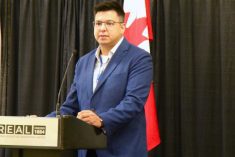Stable rural areas and thriving farms can help urbanites with some of their biggest challenges. That’s the message from the Ontario Federation of Agriculture going into next year’s provincial election.
The OFA talked about how it is framing its election strategy at its annual meeting, which ran Monday and Tuesday in Toronto.
“With the election coming up, we need to talk about the benefits we have to offer all Ontarians beyond the food on their tables,” OFA president Keith Currie said.
Rural issues don’t resonate with urban voters who are “food comfortable” and more worried about traffic congestion, housing prices and their jobs than about food.
Read Also

Electric vehicles remain wild card in China trade deal
Now that U.S. president Donald Trump’s administration has alienated many of the U.S.’s traditional allies — at least when it…
As a result, the OFA is making the case that rural areas and farms can help them out. There are some rural areas with an out-migration of population leaving behind less expensive housing and employers starved for workers.
But in order to build stronger rural communities, the OFA argues government investment is needed in the rural infrastructure that benefits both farmers and non-farmers. Urban residents take infrastructure for granted that rural residents can’t access, including natural gas for heating and broadband internet.
Top of the rural infrastructure list for the OFA is bringing natural gas to more areas of the province. That would mean cheaper home heating for farmers and non-farm residents and more economical power for factories and farms.
They are calling the strategy “distributed economic development” — the idea that economic development in one region will benefit the whole province, including people who live in cities.
Dr. David Freshwater, a professor at University of Kentucky who grew up in the Niagara Peninsula, supported the OFA message on economic development in his talk at the OFA convention.
With farmers such a tiny proportion of the population, and most economic policy being determined in the cities, he said that for urban residents, there needs to be a message to the cities that shows the value of rural economic policy to them.
“You need to create a positive message of rural opportunity,” he said.
That’s why the OFA message focuses on investments, not bailouts, and communities instead of commodities.
Currie spoke little about risk management, or farm income, or farm production practices when discussing provincial election messaging, although OFA works on all of those policy items.
“We need something different. Something bold. Something that will survive the test of time. What message can we bring to urban voters that will resonate with them?” he said.
The OFA has polled urban residents to see what they’re concerns are about living in rural areas. Their largest issues include concerns about access to good jobs and health care, along with a perception that rural schools offer inferior education.
Currie was quick to point out that the OFA isn’t advocating for unchecked growth of rural communities, as many of them already have areas available for development, or redevelopment.
“A fundamental condition and prerequisite is that farmland is protected even better than it is. Urban communities must respect our boundaries.”
The positive message about rural and agriculture and driving economic growth is easier to create with Canadian agriculture being pegged as a potential leader in creating economic growth across the country by the Barton Report — a federal government report by an expert panel that is guiding federal economic policy.
With the production of more than 200 commodities, a quarter of Canada’s farmers and $1.4 billion in farm gate output each year, agriculture in Ontario can be an economic powerhouse, Currie said.
“When we hear Mr. Barton speak of limitless potential, we need to take a much bigger approach.”
— John Greig is a field editor for Glacier FarmMedia based at Ailsa Craig, Ont. Follow him at @jgreig on Twitter.















